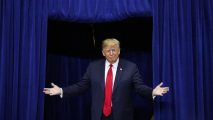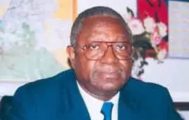Categories
Recent Posts
- World Bank increases funding to Cameroon by 21%
- Ukraine: Trump blames Zelensky for starting war after massive Russian attack
- Minister Obi Eta Jerome’s death – What do we know?
- Pope Francis transfers Cameroonian-born Nigerian Apostolic Nuncio in Sri Lanka to Ethiopia
- CDC banana exports hit 10,400 tons in Q1 2025
Archives
- April 2025
- March 2025
- February 2025
- January 2025
- December 2024
- November 2024
- October 2024
- September 2024
- August 2024
- July 2024
- June 2024
- May 2024
- April 2024
- March 2024
- February 2024
- January 2024
- December 2023
- November 2023
- October 2023
- September 2023
- August 2023
- July 2023
- June 2023
- May 2023
- April 2023
- March 2023
- February 2023
- January 2023
- December 2022
- November 2022
- October 2022
- September 2022
- August 2022
- July 2022
- June 2022
- May 2022
- April 2022
- March 2022
- February 2022
- January 2022
- December 2021
- November 2021
- October 2021
- September 2021
- August 2021
- July 2021
- June 2021
- May 2021
- April 2021
- March 2021
- February 2021
- January 2021
- December 2020
- November 2020
- October 2020
- September 2020
- August 2020
- July 2020
- June 2020
- May 2020
- April 2020
- March 2020
- February 2020
- January 2020
- December 2019
- November 2019
- October 2019
- September 2019
- August 2019
- July 2019
- June 2019
- May 2019
- April 2019
- March 2019
- February 2019
- January 2019
- December 2018
- November 2018
- October 2018
- September 2018
- August 2018
- July 2018
- June 2018
- May 2018
- April 2018
- March 2018
- February 2018
- January 2018
- December 2017
- November 2017
- October 2017
- September 2017
- August 2017
- July 2017
- June 2017
- May 2017
- April 2017
- March 2017
- February 2017
- January 2017
- December 2016
- November 2016
- October 2016
- September 2016
- August 2016
- July 2016
- June 2016
Featured
 Burkina Faso: Where vision meets discipline
Burkina Faso: Where vision meets discipline  Prosecution of journalists in Cameroon: European Parliament says enough red flags have been ignored
Prosecution of journalists in Cameroon: European Parliament says enough red flags have been ignored  1982-2025: How long will Biya hang on?
1982-2025: How long will Biya hang on?  How Biya and Archbishop Nkea protected the sanctity of the family in Cameroon
How Biya and Archbishop Nkea protected the sanctity of the family in Cameroon  October Presidential Election: Will 92-year-old Biya be re-elected?
October Presidential Election: Will 92-year-old Biya be re-elected?
Most Commented Posts
 4 Anglophone detainees killed in Yaounde
4 Anglophone detainees killed in Yaounde
18 comments Chantal Biya says she will return to Cameroon if General Ivo Yenwo, Martin Belinga Eboutou and Ferdinand Ngoh Ngoh are sacked
Chantal Biya says she will return to Cameroon if General Ivo Yenwo, Martin Belinga Eboutou and Ferdinand Ngoh Ngoh are sacked
13 comments The Anglophone Problem – When Facts don’t Lie
The Anglophone Problem – When Facts don’t Lie
12 comments Anglophone Nationalism: Barrister Eyambe says “hidden plans are at work”
Anglophone Nationalism: Barrister Eyambe says “hidden plans are at work”
12 comments Largest wave of arrest by BIR in Bamenda
Largest wave of arrest by BIR in Bamenda
10 comments
Latest Tweets
Featured
-

World Bank increases funding to Cameroon by 21%
-

Ukraine: Trump blames Zelensky for starting war after massive Russian attack
-

Minister Obi Eta Jerome’s death – What do we know?
-

Pope Francis transfers Cameroonian-born Nigerian Apostolic Nuncio in Sri Lanka to Ethiopia
-

CDC banana exports hit 10,400 tons in Q1 2025
-

Algeria to expel 12 French embassy officials
-

US: 7 900 Cameroonians face deportation
© Cameroon Concord News 2025
9, July 2018
Congo-Kinshasa faces upsurge of violence unless a deal is done with President Kabila 0
Amid a fresh wave of civil unrest in the Democratic Republic of Congo (DRC), the international community must question its confidence in President Joseph Kabila to achieve stability in a turbulent region. He has been at the helm since he took over as president in 2001 after his father, Laurent, was assassinated. The young Kabila ruled for a transitional period until 2006, before winning two elections.
He is now in his seventh year of what should have been just five years of his second term and is constitutionally barred from standing again. But he has remained in office after his mandate ended in late 2016. This, as the country awaits a long-delayed election. The delay has sparked deadly protests.
While Kabila cannot legally stand for a third term, the opposition is concerned that he might. Fears among opposition and church leaders have been further fuelled by Kabila’s appointment of three new judges to the constitutional court. Two are well-known allies.
But Kabila has no legitimacy and his authority is disintegrating. If the elections are delayed again there’s a real possibility that central Africa will slide into violent conflict once again. The armed violence is likely to be bloodier than in the past due to the number of fragmented localised groups aiming to grab their slice in one of the world’s most resource-rich countries.
Deteriorating situation
In the wake of Kabila’s refusal to cede power, the security situation has deteriorated. At least 10 of Congo’s 26 provinces are in the grip of armed conflict. This has forced over two million people to flee their homes, 800,000 of them children. The total number of internally displaced people is estimated to be 4.5 million while refugees are flocking into Uganda, Tanzania, Angola and Zambia.
The security situation in the DRC is dire. As the violence in Kasai and eastern parts of the country intensifies, escalating conflict in south eastern Congo looks set to continue.
More than 70 rebel groups are estimated to be operating in the country. They are all variously involved in skirmishes with the army or, more commonly, prey on civilians. This in turn creates a tangle of ethnic and tribal grievances for warlords to exploit.
In 2012, the M23 rebel movement briefly took the city of Goma. They were eventually thrown out by the Congolese army, supported by the UN. But the current violence in Kasai is threatening to overshadow even that disaster. In August 2017, for example, the “dead city” movements ensured that significant parts of the country’s urban population went on strike.
Some reports have suggested that more than 3,000 people have been killed since the start of 2017. More than 33,000 Kasai residents have fled into Angola. It has been suggested that the Bana Mura- a government sponsored militia – was behind the violence.
Last year major fighting occurred between Twa and Bantu populations in Tanganyika province. And as the year entered its last quarter, Uvira, on the outskirts of Lake Tanganyika, was the site for fighting between the rebel Yakutumba militia and government forces. Government forces fled and the rebels would have taken the city had they not been repulsed by Pakistani peacekeepers.
Despite a failure by the Yakutumba militia to take Uvira, it was a reminder of the level of dissatisfaction rising in the east, since the end of the Second Congo War in 2003. The rise of rebels operating in the east means violence could potentially spread to Kivu and beyond.
Uncertain times ahead
In 2017, presidential and legislative elections were delayed despite the Catholic Church reaching a deal with Kabila. The political crisis was further complicated by the death of long-standing opposition leader Étienne Tshisekedi later in the year.
The election planned for December this year is unlikely to bring together the various groups or solve the outbreak of violence in the country. The most likely candidate with the perceived ability to bring together the different groups is Moïse Katumbi. He has succeeded in rallying together opposition parties into a coalition backing his candidacy – an impressive feat in a country as fragmented as the Congo.
He also has by far the best broad plan to reconcile the country, which is what the country needs if the fragile peace is going to hold. But the country’s attorney general announced recently that Katumbi may not be eligible to stand in presidential elections because he held Italian citizenship from October 2000 until January 2017.
Under Congo’s constitution, its nationals cannot hold dual citizenship and have to petition the government to regain their citizenship if they take up a foreign nationality. But the provision, however, is loosely enforced and many prominent politicians are believed to have second citizenships.
Kabila’s time in government has shown an inability to bring together the various ethnic groups and to control the growth of dissatisfied rebel groups. This is despite the fact that the DRC has the world’s largest UN peacekeeping force, numbering 18,000 blue helmets, who try to enforce a measure of calm in the east of the country.
Source: News 24